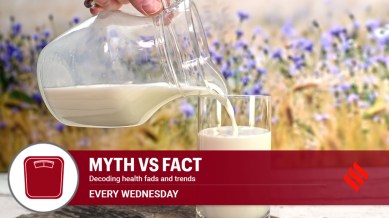Cow milk vs plant milk: Which one is better for weight loss and bone health?
By understanding the myths and facts, you can make an informed decision tailored to your goals

As debates over dietary preferences and health benefits continue, the comparison between cow milk and plant milk has become a hot topic. While cow milk has been a staple in human diets for centuries, plant-based milk has gained popularity, especially among adults. But is plant milk really better for you in your adult years? Let’s bust some myths.
Myth: Plant milk is always healthier than cow milk
Fact: Not all plant milk is inherently healthier. Cow milk is a rich source of complete proteins, calcium and essential vitamins like B12. While plant milk — such as almond, soy, oat, or coconut milk— can be healthy, their nutritional content varies widely. For example, almond milk is low in protein compared to cow milk, while soy milk provides protein levels similar to dairy. Many plant milks are fortified with calcium and vitamin D but the absorption rates might differ. Moreover, some varieties of plant milk contain added sugars, artificial flavours and thickeners, which can offset their benefits. Check the nutrition label.
Myth: Adults should avoid cow milk due to lactose intolerance
Fact: While many adults develop lactose intolerance, there are alternatives within the dairy category. Lactose intolerance is the inability to digest lactose, a sugar found in milk, leading to symptoms like bloating and gas. However, lactose-free cow milk is readily available and provides the same nutritional benefits without the discomfort. Additionally, fermented dairy products like yogurt or hard cheeses contain minimal lactose and can be better tolerated. For adults without lactose intolerance, cow milk remains a nutrient-dense choice.
Myth: Plant milk is better for bone health
Fact: Cow milk is still one of the most reliable sources of calcium for bone health. While many plant milks are fortified with calcium, the body may not absorb it as efficiently as the calcium in cow milk. Furthermore, cow milk’s balanced ratio of calcium and phosphorus supports optimal bone health.
Myth: Plant milk is better for weight management
Fact: Unsweetened almond milk is low in calories. However, oat milk and coconut milk can be higher in calories and fats, which might not align with weight management goals. Cow milk, especially skim or low-fat varieties, provides a balance of nutrients. Consider overall calorie intake and nutritional needs rather than labelling one milk type as universally better for weight management.
Myth: Cow milk causes inflammation
Fact: There is no concrete evidence that cow milk causes inflammation in healthy individuals. Some people with specific conditions, like a dairy allergy, might experience inflammation from cow milk, but this is not the norm. Plant milk, particularly soy milk, contains compounds like isoflavones, which have anti-inflammatory properties. However, the anti-inflammatory benefits of plant milk should be viewed as one component of an overall healthy diet.
(Narang is a nutritionist with Apollo Hospitals, Delhi)